
VĂN HÓA https://jst-haui.vn Tạp chí Khoa học và Công nghệ Trường Đại học Công nghiệp Hà Nội Tập 60 - Số 10 (10/2024)
112
NGÔN NG
Ữ
P
-
ISSN 1859
-
3585
E
-
ISSN 2615
-
961
9
A SOCIOLINGUISTIC STUDY ON THE ONLINE INTERACTIONS IN A KOREAN DRAMAS BLOG OF OVERSEAS VIETNAMESE FANS
MỘT NGHIÊN CỨU NGÔN NGỮ HỌC XÃ HỘI VỀ TƯƠNG TÁC TRỰC TUYẾN GIỮA NGƯỜI HÂM MỘ VIỆT NAM Ở NƯỚC NGOÀI THÔNG QUA BLOG PHIM HÀN QUỐC Le Phuong Anh1,* DOI: http://doi.org/10.57001/huih5804.2024.332 1. INTRODUCTION Over the past decades, Korean pop culture has been centered in Asia and grown all over the world. It coincides with the emergence of the internet, leading to the wide distribution of Korean dramas (K-dramas) around the globe thanks to globalization. With the fame of Korean Wave (as known as Hallyu) in Japan and China, it is impossible for Southeast Asian countries like Vietnam not to experience Korean pop culture from the late 1990s. Following the “Doi Moi” - the economic reform happened in Vietnam in 1986, with the integration policy of the Vietnam government, Vietnam saw a media boom in the early 1990s, which assisted Korean dramas in making their way to be on air on Vietnamese televisions’ channels. It can’t be denied that K-dramas have made a significant impact on Vietnamese youth culture when a lot of Vietnamese people have developed their passion for K-dramas and connect with each other who have the same interest through the support of the Internet. A lot of Korean shows, especially ones that came out in the last few years, are known for having modern looks. In these plays, the plots include both real-ABSTRACT This study explores the sociolinguistic practices of overseas Vietnamese fans of Korean dramas (K-
dramas) through their interactions on an online blog. Utilizing an online ethnography approach, the
author collected qualitative data from blog posts and interactions. The findings reveal that K-
drama
fans develop a unique vernacular, often incorporating code-
mixing, which may be incomprehensible to
non-fans. This specialized language fosters a strong sense of
belonging among fans, allowing them to
communicate more naturally and intimately. For Vietnamese fans, these interactions are particularly
significant, providing a profound sense of community and connection to their cultural interests,
especially when they
are far from home. The study highlights the importance of fandom language in
creating and maintaining social bonds within the online K-dramas fan community. Keywords: Sociolinguistic, Korean dramas, online ethnography, fandom language. TÓM TẮT Nghiên cứu này khám phá các thực hành ngôn ngữ xã hội của người hâm mộ phim truyề
n hình
Hàn Quốc là người Việt Nam ở nước ngoài thông qua các tương tác trên một blog trực tuyến. Sử dụ
ng
phương pháp dân tộc học trực tuyến, tác giả đã thu thập dữ liệu định tính từ
các bài đăng và tương
tác trên blog. Kết quả cho thấy người hâm mộ phim Hàn Quốc đã sử dụng phương pháp “trộ
n mã”
trong giao tiếp trực tuyến mà người ngoài cộng đồng có thể cảm thấy khó hiểu. Cách sử dụ
ng ngôn
ngữ đặc biệt này đã tạo nên cảm giác thuộc về mạnh mẽ và sự gắn kết thân mật giữa những ngườ
i
yêu phim Hàn Quốc. Đối với người hâm mộ Việt Nam, những tương tác này đặc biệt quan trọ
ng, cung
cấp một cảm giác cộng đồng sâu sắc và kết nối với sở thích văn hóa của họ, đặc biệt khi họ ở
xa quê
hương. Nghiên cứu nhấn mạnh tầm quan trọng của ngôn ngữ người hâm mộ trong việc tạo dự
ng và
duy trì các mối quan hệ xã hội trong cộng đồng người hâm mộ phim truyền hình Hàn Quố
c
trực tuyến. Từ khóa: Ngôn ngữ học xã hội, phim truyền hình Hàn Quốc, phương pháp dân tộc học trực tuyế
n,
ngôn ngữ người hâm mộ. 1Faculty of Arts and Humanities, University of Macau, Macau SAR, China *Email: anhlp@um.edu.mo Received: 06/9/2024 Revised: 25/10/2024 Accepted: 28/10/2024

P-ISSN 1859-3585 E-ISSN 2615-9619 https://jst-haui.vn LANGUAGE - CULTURE Vol. 60 - No. 10 (Oct 2024) HaUI Journal of Science and Technology
113
life and idealized (consumerist) city life. So, new South Korean media texts show and encourage a globalized consumerist lifestyle that is mediated. Many young people want to learn about and try out Korean dress, make-up, and way of life, even in developing Asian countries like Vietnam [1]. As a fangirl of K-dramas when I was 10 years old after watching actress Kim Huyn Joo in the drama “Glass Slippers” (released in 2002), I have admitted the positive influence of K-dramas on my lifestyle as well as the way my language practices related to K-dramas in my daily interactions. Through K-dramas, this is the first time that I have stood a chance of accessing the Korean beauty, Korean food and especially Korean language. They held the images of Korean people with adorable feelings via K-dramas’ characters, for instance, a “hard-working”, “strong” male lead and a female protagonist with “never-give-up” spirit, winning the man’s heart thanks to her kindness. Despite the extensive body of research on K-dramas, there remains a significant gap in the study of their linguistic impact on society. K-dramas are no longer a niche subject; numerous studies have explored their transnational influence on fans across Asia. For instance, Yang [2] examined the politics of differential engagements with K-dramas, particularly in relation to gender and class identities in Taiwan. Similarly, Lu et al. [3] investigated how Chinese viewers enjoy American and Korean TV dramas, focusing on cultural and genre proximity. Hayashi and Lee [4] discussed the potential of fandom and the limits of soft power through media representations of a popular Korean melodrama in Japan. These studies highlight the broad cultural and social impacts of K-dramas across different regions. However, there is a noticeable lack of research focusing on the linguistic practices associated with K-dramas and their relationship with society. This paper aims to address this gap by examining the linguistic habits of a group of overseas Vietnamese fans who engage in an online blog dedicated to K-dramas. The rapid evolution of the Internet has facilitated the widespread dissemination of Korean entertainment culture in Vietnam, leading to a vibrant fandom culture. In recent years, this phenomenon has sparked extensive discourse in Vietnam, yet the linguistic dimensions of this engagement remain underexplored. By focusing on the linguistic practices of these fans, this study seeks to contribute to a deeper understanding of how K-dramas influence language use and social interactions within this specific community. 2. THEORETICAL FRAMEWORK AND RESEARCH METHODS 2.1. Fandom as Speech Communities A lot of research has shown the different definitions of a speech community. Rampton [5] describes a “speech community” as a complex and evolving concept. He views it not just as a group sharing linguistic norms, but as a dynamic, interactive entity where social actions and linguistic practices are intertwined while Inoue [6] suggests that a speech community should integrate the historicity, materiality, and space-place distinctions of language. In the context of globalization and late capitalism, these modifications acknowledge the fluid boundaries of speech communities. Fandom can be viewed as one of the speech communities whose dialect has its own set of traits that members of this organization shared with each other. International K-drama fans are defined as Non-Korean fans whose mother tongue is not Korean. Regardless of the language barrier and geographical distance, they still have a big passion and obsession for K-dramas. Vietnamese fans could be considered as a part of International K-dramas fans community. The target subjects of this paper are K-dramas Vietnamese fans, who belong to generation Y (as known as millennials) - “the first generation who was blessed to experience both an analog and digital world” (Voiceover from Reply 1994 K-drama) in Vietnam where the Internet appeared in 1997. Although attention to language usage is not new in fandom studies, studies have generally interpreted the particular vocabulary of fandoms as culturally produced “secret codes” connected to collective identity. For instance, Hellekson and Busse [7] observed the use of slang words in fannish hashtags, genres, and categories as a new form of textual poaching, with its own set of aesthetic sensibility, fannish rules, and network. Besides examining the language of fandom as a mere code or tool, the author takes the sociolinguistic perspective of interpreting fandom as a speech community, in which the communicative patterns act as the key to understanding how members of online audiences coalesce into interpretive communities and then into speech communities [8]. 2.2. Social Identity Theory Social Identity Theory (SIT), developed by Tajfel and Turner [9], has significantly influenced the understanding

VĂN HÓA https://jst-haui.vn Tạp chí Khoa học và Công nghệ Trường Đại học Công nghiệp Hà Nội Tập 60 - Số 10 (10/2024)
114
NGÔN NG
Ữ
P
-
ISSN 1859
-
3585
E
-
ISSN 2615
-
961
9
of intergroup relations and social behavior. SIT posits that individuals derive a sense of identity and self-esteem from their group memberships, which in turn influences their attitudes and behaviors towards in-group and out-group members. One significant aspect of SIT is its integration with Self-Categorization Theory (SCT), which further elaborates on how individuals categorize themselves and others into social groups. SCT explains how group norms and behaviors are internalized, leading to uniformity in group behavior and the emergence of collective phenomena from individual cognitions [10]. Social Identity Theory (SIT) provides a valuable framework for understanding the dynamics of fandom language. SIT posits that individuals derive a sense of identity and self-esteem from their group memberships, which fosters a strong sense of belonging [9]. 2.3. Research Methods This research is conducted through an online ethnography via a blog about K-dramas owned by an overseas Vietnamese, guided by the following two questions: (1) What are the specific linguistic features of Korean lexical incorporation in the language of overseas Vietnamese K-drama fans? (2) How does the language used by overseas Vietnamese K-drama fans reflect their social identity? Online ethnography, also known as digital or virtual ethnography, is a qualitative research method that adapts traditional ethnographic techniques to study communities and cultures within digital environments. Researchers engage with participants through online platforms such as forums, social media, and chat rooms, observing interactions, analyzing content, and sometimes participating in discussions to gain an insider perspective on the digital community’s dynamics and cultural practices [11]. This method is particularly valuable for understanding how people form and maintain relationships, express identities, and create meaning in virtual spaces. It allows researchers to explore the evolving digital landscape, uncover hidden patterns, and gain insights into global communities without the constraints of physical borders. 2.4. Data Collection and Analysis The data of this study is from the content from Ginko’s Garden website (https://ginkovn.wordpress.com/). This blog is known to be the K-dramas sky of Vietnamese fans, where they can initiate K-dramas discussions and conversations, exchange opinions about K-dramas and ways of life via K-dramas they watched. It also covers the K-drama reviews and blog owners’ ratings, sometimes focusing on individual dramas for “recaps”. Target members of Ginko’s Garden used to work and study abroad, have their own point of views about K-dramas and especially don’t watch K-dramas based on trends. The total number hits of this blog is 1,116,162 currently. The study used a low-key approach, collecting data that was found and observed [12]. This data included written blog posts consisting of three key themes: K-drama reviews, K-drama recaps, K-drama sharing thoughts , and interactions between members on the blogs via the “comment section”. The main goal was to examine the linguistic practices that overseas Vietnamese fans use to express their viewpoints on K-dramas content and how their social identity through online activities are formed, so the study didn’t deeply analyze the content of the dramas. Using an online ethnography approach, the researcher observed and participated in the comment section of a blog dedicated to Korean dramas. This method allowed for an immersive understanding of the community’s dynamics and cultural practices. The data collection spanned three months, focusing on written content, visual imagery, and interactions. The researcher employed inductive qualitative content analysis to identify patterns and themes. Analysis of the top posts revealed that those attracting the most views often featured in-depth reviews of recent K-dramas, highlighting popular trends and viewer preferences. Posts from ten years ago that garnered the most comments provided insights into the evolution of audience engagement and interests over time. Additionally, “reunion posts,” where long-time inactive members returned to comment, were examined to understand the sense of community and nostalgia within the forum. These posts often sparked lively discussions and reconnected old members, showcasing the enduring impact of K-dramas on their lives, and through this comprehensive analysis, the researcher gained valuable insights into how fans engage with K-dramas, form identities, and maintain relationships within the digital space.

P-ISSN 1859-3585 E-ISSN 2615-9619 https://jst-haui.vn LANGUAGE - CULTURE Vol. 60 - No. 10 (Oct 2024) HaUI Journal of Science and Technology
115
3. RESULTS AND DISCUSSION 3.1. Results 3.1.1. Code-mixing From my daily observations of Ginko’s Garden, I have recognised that this speech community has shared a unique way of using languages by using code-mixing in response to the first research question. According to Shafie and Nayan [13], code-mixing means mixing multiple languages together and is a common trend on social media networking sites. In Ginko’s Garden, participants used Vietnamese as the blog’s primary language of communication, yet they often insert English and Korean in romanization into their texts. Figure 1 will show you the way a Vietnamese fan discuss the Korean drama “The Light In Your Eyes” using adding English words while the texts include Latinized Korean words are listed in Figure 2. “Speechless! Mình nổi da gà ở mấy phút cuối. Best plot twist! Best of the best! Tất cả giải thích hợp lý cho mạch phim tứ tung bốn phía không theo một hướng nào. Giống như xem tập 8 xong mình đã nói, không biết xếp phim này vào dạng nào, vì nó không có một hướng rõ ràng phim sẽ đi về đâu. Giờ thì đã có câu trả lời! Master piece!” [Speechless! I got goose bumps in the last few minutes. Best plot twist! Best of the best! All scenes are reasonably explained for the random storyline that is assumed to lead us to nowhere. I hadn’t figured the genre of this drama after having watched episode 8 because there were no clear hints to know the drama’s direction but now I have already had my answer. Masterpiece!] Figure 1. A comment on the Korean drama “The Light In Your Eyes” (Source: Ginko’s Garden) “Makjang đúng là dramatizing kịch bản mà, cứ ném càng nhiều bi kịch bất hạnh vào cho nhân vật chính thì càng tốt, kiểu như khơi gợi lòng thương ở khán giả đó, rồi sau đó khán giả tích cực theo dõi vì tò mò với số phận của nhân vật. Redkye nói đúng quá, makjang không phải là gia vị mà chính là gạo, là cơm của drama Hàn đó.” [Makjang is such a type of dramatizing script, the more unfortunate tragedies are thrown at the main character, the better it is, like inciting compassion from the audience, consequently they would actively continue watching on the account of their curiosity about the fates of the characters. Redkye’s comment is right, makjang is not the spice but it is the main course of Korean dramas.] Figure 2. A comment on one type of Korean dramas: Makjang (막장) It is clear that target subjects add English into their texts because they grew up when Vietnam carried out the open-door policy and English replaced Russian to become the first foreign language in Vietnam. They had the opportunity to learn English at least from secondary school to university. Additionally, we can see that romanization is based on standard Korean pronunciation, the word Makjang (막장) in Figure 2 is the example of how fangirls use Korean words. Vietnamese fans add Latinized Korean words because the Vietnamese alphabet uses the Latin alphabet system, which makes it easier to express Korean terminology by their own alphabet system. Furthermore, when they need to put their ideas across strongly, code-mixing by using Latinized Korean words is necessary, especially when they find it difficult to express exact meanings of words in Vietnamese. For instance, the Korean word “Makjang” referring to the storyline or plot in K-dramas that goes to the extreme, in unrealistic ways to attract high TV ratings, is complex to explain in one Vietnamese word. Almost all of them use these Latinized Korean words because they find themselves more expressive in conveying their points and allowing them to feel more immersed in Korean culture. Another pattern of code-mixing found on online interactions are the unique fans’ abbreviation terms that only people in the speech community of K-dramas can utilize and understand their meanings. In online discussions, fans use specific slang and abbreviations related to K-dramas. For example, “OTP” stands for “One True Pairing” (a favorite couple), and “SLS” stands for

VĂN HÓA https://jst-haui.vn Tạp chí Khoa học và Công nghệ Trường Đại học Công nghiệp Hà Nội Tập 60 - Số 10 (10/2024)
116
NGÔN NG
Ữ
P
-
ISSN 1859
-
3585
E
-
ISSN 2615
-
961
9
“Second Lead Syndrome” (when fans prefer the secondary character over the main lead). 100% comments from members in Ginko’s Garden blog use English abbreviation words that are only used when talking about K-dramas. Abbreviations usually used by fans are BTS (behind the scene); OST (Original Sound Track), the name of Kdramas such as QIHM (Queen In-hyun's Man); et cetera. In the Korean entertainment industry, we need to understand the formula of making a Korean drama. Besides the plot, the cast, and the storyline, the original soundtrack and behind the scene sections play a significant role in drawing viewers’ attention. That’s why these abbreviations were born and K-drama fans are familiar with and have the habit of using them. 3.1.2. Sense of Belonging The social identification of overseas Vietnamese fans, particularly within the context of K-drama fandoms blog, reveals a profound sense of belonging and community through the language use. The authors of the blog posts strive to maintain a pure Vietnamese linguistic style, emphasizing the importance of cultural authenticity and positive emotional expression, which explains how the language used by overseas Vietnamese K-drama fans reflects their social identity in the second research question. Despite their rational and mature approach to fandom, their passion remains undiminished, and they continue to write in Vietnamese, thereby reinforcing their cultural identity and connection to their roots [15]. Furthermore, core members of Ginko's blog have maintained strong connections over the years, weathering both bustling and quiet times. Even when readership dwindled to just a few per week, the blog remained a steadfast platform, preserving the shared emotions and experiences of the past [14]. This enduring presence underscores the deep bonds formed within the community, reflecting the principles of Social Identity Theory, where group membership provides a significant source of self-esteem and identity. Through Ginko’s blog, they engage in lively discussions, dissect plot twists, and speculate about future episodes. This interaction not only provides entertainment but also a comforting sense of familiarity and connection: “Ginko’s blog has been around for 15 years. To be exact, the first post was about Coffee Prince Shop on August 25, 2009; Ginko didn’t remember until WordPress reminded me of today. Thank you for the long time we spent together, from the bustling times to the quiet times, when there were only a few readers for weeks and months. However, my blog is still here, preserving the emotions of the past. I hope to meet many new friends, meet many old friends, and still have a small garden for friends to visit when they miss me.” (Quote from Ginko - the blog owner) For many, these online communities become a surrogate family, offering emotional support and a shared identity. This sense of belonging is particularly significant for those living abroad, as it helps mitigate feelings of isolation and homesickness and keeps them connected to their roots and to others who share their enthusiasm. “Hello everyone. Hugs and hugs to Ginko, NH, Vit, and especially Tiny, who has welcomed a baby. It's hard to believe that 10 years have passed so quickly! After listening to my friends' invitation, I watched The Light in Your Eyes until episode 6. I really like the relationship between Hye-Ja and Joon-Ha; I like it more than MISA and WISFC. The excess of love in the other two movies didn't resonate with me. I prefer this genre as it offers a unique perspective compared to other Korean films.” (Quote from Tieu Phong - an active member) “Hello Tieu Phong and Ginko, hugs to both of you. Ginko Garden is a comfort to me, after all this time, visitors to the garden may not retain the innocent and cute things of the past, but the garden owner has never turned anyone away.” (Quote from Ladyvitvitno1 - an active member) 3.2. Discussion In the context of fandoms, the sense of belonging is reinforced through the use of specific jargon, memes, and phrases that are unique to the community. These linguistic practices are in line with Leuckert (2020)’s research [16] on social identity in digital communities builds on the foundational principles of Social Identity Theory (SIT) proposed by Tajfel and Turner [9]. Leuckert emphasizes the importance of shared linguistic features and meta-comments in forming a cohesive social identity online like those on Reddit, create a sense of belonging and identity through shared language and interactions, which aligns with Tajfel and Turner’s ideas about how group membership and social categorization influence identity and intergroup behavior. Within the K-drama community, the utilization of "secret codes" is essential for cultivating a shared identity. These codes frequently incorporate particular phrases, allusions to renowned



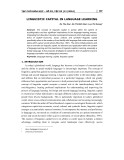
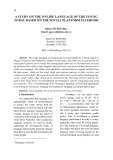





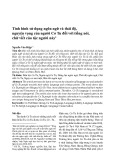
![Bộ câu hỏi trắc nghiệm Văn bản tiếng Việt [chuẩn nhất]](https://cdn.tailieu.vn/images/document/thumbnail/2025/20251127/thuynhung051106@gmail.com/135x160/24021764296609.jpg)


![Bài giảng Ngôn ngữ học đối chiếu Nguyễn Ngọc Chinh [PDF]](https://cdn.tailieu.vn/images/document/thumbnail/2025/20251101/vovu03/135x160/7471762139652.jpg)


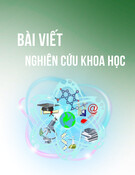

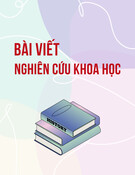


![Ngân hàng câu hỏi môn Tiếng Việt thực hành [chuẩn nhất]](https://cdn.tailieu.vn/images/document/thumbnail/2025/20251003/kimphuong1001/135x160/21861759464951.jpg)
![Bài giảng Văn học phương Tây và Mỹ Latinh [Tập hợp]](https://cdn.tailieu.vn/images/document/thumbnail/2025/20251003/kimphuong1001/135x160/31341759476045.jpg)


